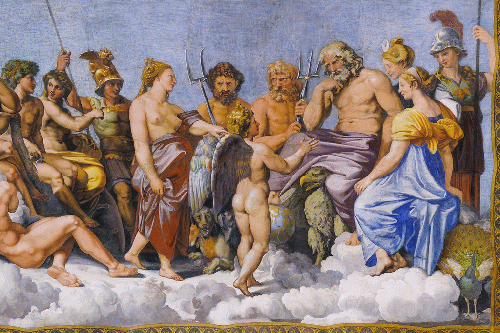Atheists bet on the wrong theistic horse
When atheists challenge religion, they pick on monotheism. Their explanations of what supernatural monotheism is really about are as follows:
- It uses pre-scientific explanatory strategies.
- What it describes are really seasonal phenomena.
- The characters are prehistorical political figures.
- It uses vague and muddled language.
- Its sacred beings are neurotic projections.
- Religious ideas are bugs in the human neurological programming.
However, the idea that there must be some single reality, underlying the wild diversity of gods hasn't been challenged by atheists. Why don't atheists pick on polytheists as well? Most likely, they were raised in monotheism and know its weaknesses well. Since polytheists are in the vast minority in the United States, their traditions were not closely studied. In addition, atheists are likely to have bought the monotheistic propaganda against polytheists: its cosmology is chaotic; its practice is preoccupied with sex and pleasure; its reasoning is short on abstract thinking; and its gods are a reification of images. Further, monotheists complain that polytheistic gods are not ambitious enough: they not there all the time and not in space all the time. This article not only challenges these ideas about polytheism, but following John Michael Greer in his book A World Full of Gods, I explain why polytheists are much better opponents for atheists than monotheists. Greer states that atheist arguments are against Christians and Jews and have little relevance when used against paganism. Perhaps the diversity of human sacred experience is an accurate response to the diversity of divine reality.
What makes polytheism broader than either monotheism or atheism
What makes polytheists different from both monotheists and atheists is that it applies the same critical tools it uses against atheism and monotheism to itself. Monotheists say that polytheists and atheists are mistaken and have all kinds of problems, but those same problems are not applied to their own beliefs. So too, atheists criticize monotheists, but they don't apply their same reasoning to atheism. Polytheists show the limitations of monotheism and atheism, but they apply the same criteria to their own thinking, so they accept the plurality of beliefs. In other words, polytheists admit that monotheism, atheism, and polytheism all have problems, but the fact that all three exist says something about the reality of diversity. What both monotheism and atheist have in common is there is one single truth, and they argue over which has it. Polytheists don't do this.
Monotheism as the imperialism of religion
Many people use the word "theism" as though it inevitably implies monotheism. But monotheism is not the only theism in town. Greer points out that works on philosophy of religion are still written as though the choices are atheism on the one hand and some variant of classical monotheism on the other. The idea that there must be some single reality underlying the wild diversity of gods has rarely been challenged. Whatever "the sacred" might be, to Eliade, in his studies of the history of religion, there's only one version of the sacred, and all the mystics and saints had to be experiencing the same things. The religiopolitical task is to deny, demonize, or at least subordinate luxuriant polytheistic growth. If all polytheistic systems are by definition false, illusions, demons, or guises behind which monotheism waits to be found, the competing field of deities is cleared for monotheists to be the only theism in town to battle atheism.
Polytheism afoot
A substantial number of people from wholly orthodox Christian and Jewish backgrounds have broken decisively with the god of classical monotheism. The history of modern pagan revival is intricate and only just has begun to receive the attention of serious scholars. Its origins reach back to the late 18th century. Wicca remains the largest of the modern pagan movements. As of 2005 a midrange estimate suggests there are between one and two million followers of modern pagan religions in America. For the history see Margret Adler, Drawing Down the Moon and Cynthia Eller, Living in the Lap of the Goddess.
Exoteric vs Esoteric theism
The more fundamentalist monotheists deny the reality of different sacred experiences and deny the existence that other gods exist but theirs. But the more liberal, upper middle-class traditions of monotheism are perennials. They say there is exoteric religion which is filled with superstition and what the masses believe. These are usually the same working-class folks who atheists pick on. However, any religion also has an esoteric wing is the core of any religion. It is not superstitious - God does not throw down thunderbolts or call people sinners. All the world religions have the same core which only the few understand. All esoteric perennialists say all sacred experience are the same, but they have different cultural meanings. Most polytheists make no such division and place ordinary religion at the center.
Polytheists also have a similar exoteric-esoteric division. Wicca is generally open to men and women without any formal training. But there are magical traditions in the West which require special study and a grading system in which mysteries are revealed. However, esoteric polytheists do not say that all people who make the grade have the same underlying experience. For example, the mystical path up the center of the tree of life is different from the magical paths to its right or left. Polytheists claim that the difference between an Anglican mystical experience, an Islamic mystical experience of Sufi dancing, and the vision of a buffalo spirit on a Native American vision quest are all different experiences because they have contacted three different spiritual beings. There can be more than one Sacred experience.
Lesser sacred presences
For polytheists there are levels of sacred beings to serve: the gods of nature who provide sustenance; the gods of the community who provide peace and atmosphere for civilized life; the spirits who provide more narrowly defined blessings; the ancestors who provide family and heritage; the genius who provides personal guidance and protection. Another example is the prevalence of ancestor worship in contemporary Japan. In Greece, each nymph was believed to be active in a relatively small area, and to have power only over a limited aspects of the natural and human worlds. Nymphs were believed to have power surpassing human beings, but nothing even remotely like omnipotence or omniscience was ever attributed to them.
(Note: You can view every article as one long page if you sign up as an Advocate Member, or higher).






